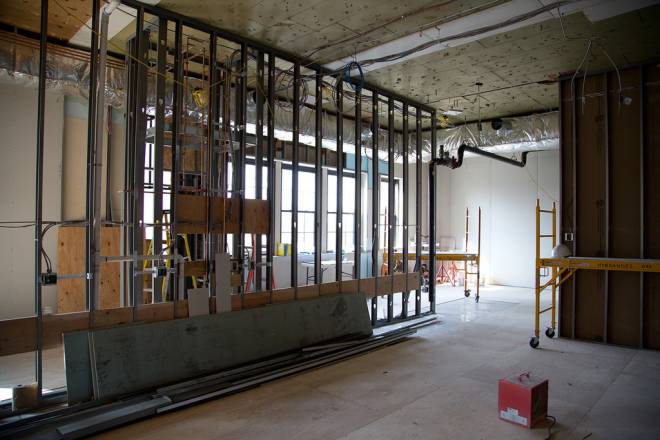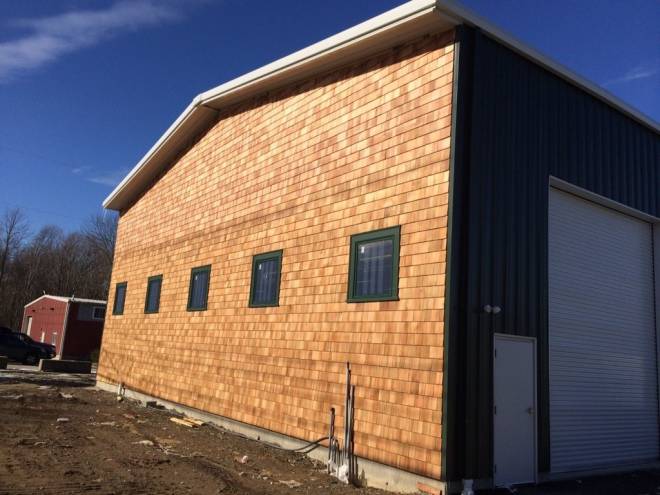Blazing through the shaky business climate of the past several years is the fresh trend of mixed-use spaces. Refurbished buildings, shared spaces and collaborative efforts are taking center stage as the East Bay sets the trend in entrepreneurship and business development for the rest of the state. Here’s the scoop on a few up and coming mixed-use spaces and how they are helping the area thrive.
One School to Feed Them All
An old school in Warren becomes the state’s first food incubator
One of the most hotly anticipated events this year is the upcoming June opening of Hope & Main in Warren, Rhode Island’s very first culinary business incubator. Currently under construction, the incubator will be housed in a refurbished 1915 schoolhouse on Main Street. The fully renovated space will allow local start-up food businesses access to commercial kitchens, production and storage spaces and other amenities, while providing them with a vital community of entrepreneurial support and a wealth of business resources to help them succeed in the food industry.
In 2009, Hope & Main founder Lisa Raiola was looking into starting her own food business. What she encountered was the enormous hurdles that face culinary businesses. To legally sell food, a business must be cooking out of a certified, code-compliant kitchen. To gain access to this type of space, as well as all of the other aspects that go into producing and marketing a successful food product, businesses are often looking at a six-figure start-up cost. Due to this, not only is there a high bar for entry into the culinary business, but a high failure rate as well. Looking for properties, Raiola had an epiphany. “I was standing in this beautiful old schoolhouse that had been shuttered for years,” she says. “I thought, I bet there are a lot of people like me. Maybe a lot of people can start businesses in this space.” And the idea for Hope & Main was born.
After several years of negotiating and securing federal funding through a USDA Community Facilities Loan, Hope & Main is nearing completion. The space will feature three code-compliant, shared-use commercial kitchen spaces fully outfitted with state-of-the-art equipment, suitable for the needs of most startup bakers, caterers and specialty food product makers. One kitchen will be entirely gluten-free. There will be over 6,000- square-feet of production space, including cold and dry storage. The building will also hold a demonstration kitchen and classroom for education and training on food and nutrition related topics and a 2,000-square-foot community room for events and seminars. The ample parking lot will soon host a Town Market, featuring products from the member companies as well as local artisans, farmers and fishermen. “We are really creating a community space that is all about local food, public health and the food economy, for all segments of the population,” says Raiola. “We have so much potential for food and agriculture in Rhode Island that is largely untapped because we haven’t had the infrastructure to support building a food economy here. That’s what Hope & Main is about: building that food economy and giving people access to it.”
Another feature of Hope & Main is the business guidance and support it will provide its member companies. The space is able to incubate up to 50 businesses at a time, and these companies will not only enjoy access to the facilities but to a host of other resources to assist each startup in navigating through the complex terrain of running a food business. “When you’re getting started,” says Raiola, “you might not know how to package, how to price your products and how to market and distribute them. You might not know what kinds of licenses you need for the products you are making. This is the other part of the equation that food startups need.” This feature is tremendously appealing to the small businesses that have already joined Hope & Main.
Barbara Link of Agraria Farms in Rehoboth is a small organic farmer specializing in unusual and heirloom varieties of fruit. Through her partnership with Hope & Main, she will take her products to the next level with recipe formulation and nutrition testing in order to be able to sell them wholesale. “I wouldn’t even know where to begin if I were doing this on my own,” she says. “What is amazing about Hope & Main is all of the business expertise they bring, the assistance with business planning, financial planning, branding and packaging, marketing and training in Department of Health processes. They have readily available resources to assist with all facets of bringing a product to market.” Due to supports like these, it’s been shown that businesses in incubators have an 80% better chance at success than those going at it on their own.
Another incubee, Zared Goldfarb, seconds this. His company, Fox Point Pickling Co., hopes to become “Rhode Island’s pickle” by creating hand-crafted, hand-packed pickled vegetables using local RI produce. “Hope & Main is allowing me to follow my dream by providing crucial resources along with education and guidance to help me as an entrepreneur. This is essential for my success given I have limited experience starting my own business,” he says. “In the short time that I have been involved with the program, I have already been able to learn from professional chefs, restaurateurs and other like-minded people who I normally wouldn’t have access to.”
The anticipated length of incubation at Hope & Main is approximately three years. During this time, each startup will be guided in crafting their business and exit plan, growing to the point where they have the sales and contracts to be able to launch into their own space. Applications are accepted on a rolling basis. There is also funding for low to modern income entrepreneurs who want to start their own food business available through a Community Development Block Grant from the federal government.
The management team is already hosting a Food Startup Workshop Series, educating members and the general public on topics like legal basic for food startups and branding and marketing. Apply to be a part of Hope & Main or find a workshop to attend at
their website.
 The Perfect Fit
The Perfect Fit
Tupelo Cove (pictured above) offers affordable flex space in Bristol
When Angus and Joanna Davis of Bristol purchased the site for Tupelo Cove at 75 Tupelo Street in Bristol, it was a former lumberyard zoned for general business. They wanted to offer affordable spaces for local tradesmen, who were feeling the real-estate crunch with existing flex space in the East Bay being near 100% occupancy. Today, the site holds two brandnew 15,000 square foot buildings with a total of 20 units of 1,500 square feet each and offers efficient, professionally managed commercial and industrial spaces. Each unit features a generous 14x16 roll-up door, three parking spaces, lavatory, energy efficient gas heating, skylights and three-phase electrical service. “We are zoned for manufacturing uses,” explains Joanna Davis, “allowing many types of businesses and we are located in the state ‘Enterprise Zone,’ which offers tax advantages to our tenants. Our overarching goal is to help local businesses grow to support job growth in Bristol’s economy.” The new, state-of-the-art constructions have made the space very appealing to tradesmen, particularly due to the extra large garage doors. The first building is 70% leased and the second will be completed this month. Current tenants include Kinder Industries, a leading marine canvas manufacturer, Preppy Pig BBQ, a catering company, and Crystal Clear Car Detailing.
Pack Your Bags
New directions for the American Tourister Mill (rendering pictured below)
Ambitious plans to renovate The American Tourister Factory on Main Street in Warren are working their way through the design and approval process with the Warren Planning Board. Last year, the waterfront property was purchased for $2.6 million by New Hampshire company Brady Sullivan Properties, which specializes in mill renovation projects. They have teamed up with Starr Development Partners of Massachusetts to form Tourister Mill LLC and have unveiled the tentative vision for the property. Developers are planning a combination of residential and commercial/retail spaces. Due to flood regulations, the historic brick building cannot have living spaces on the first floor. So it will house a mixture of indoor parking spaces and commercial and retail spaces, such as coffee shops, small restaurants, office space and a gym. Upstairs will be upscale, one - to - two bedroom apartments catering to young professionals, retirees and empty nesters. There are also plans to construct a third floor on top of the main building to add additional space. There will be additional parking spaces outdoors, as well as other features such as up to three acres of green space. The architects for Tourister Mill do not plan to alter the exterior look of the building significantly, to keep with the historic character of the town. After development is complete, Tourister Mill LLC plans to remain with the mill as property managers.
Mixing Things Up
A new kind of live/work space in Tiverton
Johnston developer Carpionato Properties has unveiled their plans to construct a mixed-use space in Tiverton on a 66-acre site near the intersection of Routes 24 and 138. The plan includes a 100-room hotel, up to 150 apartments, 385,000 square feet of shops and restaurants and 172,000 square feet of office space. “There’s not a lot of shopping choices in Tiverton right now,” says Kelly Coates, senior vice president of leasing at Carpionato. “Most of our retail dollars leave the community, so what we have here is a way to capture those dollars. It will keep retail goers home in Tiverton and also invites other shoppers from outside the community.” The development is in the master planning stage right now and will be going before the Planning Board this spring, with construction slated to begin in 2015. The appeal of mixed-use developments comes from the village concept, a place where you can live, work and shop. “Office users have come to really like this concept,” says Coates. “You get all the benefits of a suburban office park and are able to leave your office for lunch and walk to four or five restaurants or go shopping.” The developers project the property to be a major tax-generating parcel for the town. “This will establish a secure revenue stream for the future, establish employment in the community, and it means you will stay in Tiverton to shop,” says Coates.
Comments
No comments on this item Please log in to comment by clicking here